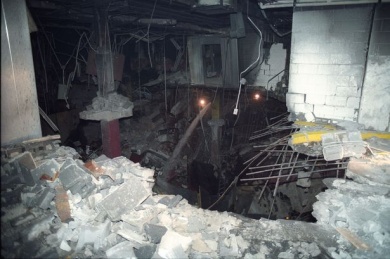1993 World Trade Center bombing
 | |
| Date | February 26, 1993 |
|---|---|
| Location | World Trade Center, New York, USA |
| Type | 40px truck bomb |
| Deaths | 6 |
| Injured (non-fatal) | 1042 |
| Description | A bomb attack on the World Trade Center which several authors have suggested was not a surprise to the FBI. A confidential CIA internal survey reportedly concluded that it was "partly culpable". |
| Perpetrators | CIA?, Cabal? |
| Blamed on | Ramzi Yousef, Mahmud Abouhalima, Mohammad Salameh, Nidal A. Ayyad, Abdul Rahman Yasin, Ahmad Ajaj |
The 1993 World Trade Center bombing occurred when a single bomb exploded at 12:17:37 p.m. on February 26, 1993.
Contents
Official Narrative
In March 1994, four men were convicted of carrying out the bombing: Mahmud Abouhalima, Nidal A. Ajaj, Mohammad Salame and Nidal A. Ayyad. The charges included conspiracy, explosive destruction of property, and interstate transportation of explosives. In November 1997, two more were convicted: Ramzi Yousef the "mastermind" behind the bombings, and Eyad Ismoil, who drove the truck carrying the bomb. In October 2001 in a PBS interview, former CIA Director James Woolsey claimed that Ramzi Yousef worked for Iraqi intelligence.[1] Laurie Mylroie supported the theory that Saddam Hussein was ultimately responsible.
Problems
In March 2008, the Pentagon released its study of some 600,000 documents captured in Iraq after the 2003 invasion, which "found no 'smoking gun' (i.e., direct connection) between Saddam's Iraq and al Qaeda."[2] Among the documents released by the Pentagon was a captured audio file of Saddam Hussein speculating that the 1993 attack on the World Trade Center had been carried out by Israel or American intelligence, or perhaps a Saudi or Egyptian faction. Saddam said that he did not trust the bomber Yasin, who was in Iraqi custody, because his testimony was too "organized." The Pentagon study found that Yasin "was a prisoner, and not a guest, in Iraq."[3] Mylroie denied that this was proof of Saddam's non-involvement, claiming that "one common purpose of such meetings was to develop cover stories for whatever Iraq sought to conceal."[4]
Other Theories
In his essay Fifty Years of the Deep State, researcher Mark Gorton suggests that the 1993 World Trade Center bombing was a false flag attack carried out at the behest of George H. W. Bush to facilitate the 9-11 operation:
“The 1993 WTC bombing created the necessary pretext for a massive engineering upgrade of the WTC complex. The purpose of the 1993 WTC bombing was not to bring down the WTC. A truck bomb could not bring down a structure as large as the WTC. The purpose of the 1993 WTC bombing was to create a rationale for a “security upgrade” of the WTC complex. And for this purpose, the 1993 WTC bombing succeeded perfectly. According to Alan Reiss, the PANYNJ’s World Trade Center Director, “After the 1993 bombing, we implemented a ten-year redevelopment program. We were spending a half a billion dollars on upgrades. It was an engineer’s dream”. After the 1993 bombing, the PANYNJ brought in Kroll Associates to do a “complete security analysis”. The executive director of the Port Authority emphasized the importance of Kroll’s work at the WTC by saying, “We have such confidence in [Kroll] that I have followed every one of their recommendations. The person who led Kroll’s work on the WTC was Brian Michael Jenkins.”
Mark Gorton [5]
CIA "partly culpable"
In 1998 the UK Independent reported that a confidential CIA internal survey had concluded that the CIA was "partly culpable" for the bombing.[6]
Other circumstances
The United States Attorney for the District of New Jersey at the time was deep politician (and later US Secretary of Homeland Security) Michael Chertoff.
The Official Culprits
| Name |
|---|
| Abdul Rahman Yasin |
| Ahmad Ajaj |
| Mahmud Abouhalima |
| Mohammad Salameh |
| Nidal A. Ayyad |
| Ramzi Yousef |
References
- ↑ http://web.archive.org/web/20081029173805/http://www.pbs.org/wgbh/pages/frontline/shows/gunning/interviews/woolsey.html
- ↑ http://web.archive.org/web/20081031075111/http://www.fas.org/irp/eprint/iraqi/v1.pdf
- ↑ Eli Lake, Report Details Saddam's Terrorist Ties, New York Sun, March 14, 2008.
- ↑ Laurie Mylroie, More To Uncover on Saddam, New York Sun, April 2, 2008.
- ↑ Document:Fifty Years of the Deep State
- ↑ http://www.independent.co.uk/news/terror-blowback-burns-cia-1182087.html